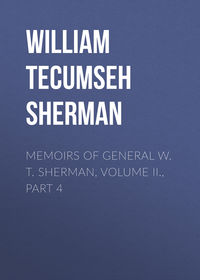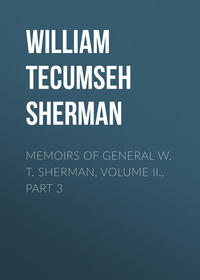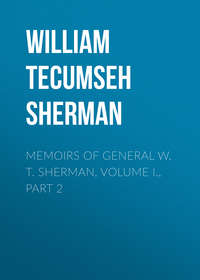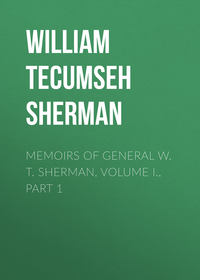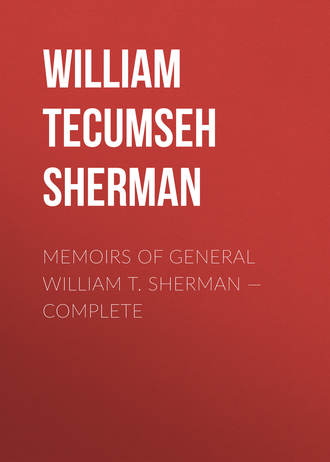 полная версия
полная версияMemoirs of General William T. Sherman — Complete
About the middle of August I got a note from Brigadier-General Robert Anderson, asking me to come and see him at his room at Willard's Hotel. I rode over and found him in conversation with several gentlemen, and he explained to me that events in Kentucky were approaching a crisis; that the Legislature was in session, and ready, as soon as properly backed by the General Government, to take open sides for the Union cause; that he was offered the command of the Department of the Cumberland, to embrace Kentucky, Tennessee, etc., and that he wanted help, and that the President had offered to allow him to select out of the new brigadiers four of his own choice. I had been a lieutenant in Captain Anderson's company, at Fort Moultrie, from 1843 to 1846, and he explained that he wanted me as his right hand. He also indicated George H. Thomas, D. C. Buell, and Burnside, as the other three. Of course, I always wanted to go West, and was perfectly willing to go with Anderson, especially in a subordinate capacity: We agreed to call on the President on a subsequent day, to talk with him about it, and we did. It hardly seems probable that Mr. Lincoln should have come to Willard's Hotel to meet us, but my impression is that he did, and that General Anderson had some difficulty in prevailing on him to appoint George H. Thomas, a native of Virginia, to be brigadier-general, because so many Southern officers, had already played false; but I was still more emphatic in my indorsement of him by reason of my talk with him at the time he crossed the Potomac with Patterson's army, when Mr. Lincoln promised to appoint him and to assign him to duty with General Anderson. In this interview with Mr. Lincoln, I also explained to him my extreme desire to serve in a subordinate capacity, and in no event to be left in a superior command. He promised me this with promptness, making the jocular remark that his chief trouble was to find places for the too many generals who wanted to be at the head of affairs, to command armies, etc.
The official order is dated:
[Special Order No. 114.]
HEADQUARTERS OF THE ARMY
Washington, August 24, 1881.
The following assignment is made of the general officers of the volunteer service, whose appointment was announced in General Orders No. 82, from the War Department
To the Department of the Cumberland, Brigadier-General Robert Anderson commanding:
Brigadier-General W. T. Sherman,
Brigadier-General George H. Thomas.
By command of Lieutenant-General Scott:
E. D. TOWNSEND, Assistant adjutant-General.
After some days, I was relieved in command of my brigade and post by Brigadier General Fitz-John Porter, and at once took my departure for Cincinnati, Ohio, via Cresson, Pennsylvania, where General Anderson was with his family; and he, Thomas, and I, met by appointment at the house of his brother, Larz Anderson, Esq., in Cincinnati. We were there on the 1st and 2d of September, when several prominent gentlemen of Kentucky met us, to discuss the situation, among whom were Jackson, Harlan, Speed, and others. At that time, William Nelson, an officer of the navy, had been commissioned a brigadier-general of volunteers, and had his camp at Dick Robinson, a few miles beyond the Kentucky River, south of Nicholasville; and Brigadier-General L. H. Rousseau had another camp at Jeffersonville, opposite Louisville. The State Legislature was in session at Frankfort, and was ready to take definite action as soon as General Anderson was prepared, for the State was threatened with invasion from Tennessee, by two forces: one from the direction of Nashville, commanded by Generals Albert Sidney Johnston and Buckner; and the other from the direction of Cumberland Gap, commanded by Generals Crittenden and Zollicoffer. General Anderson saw that he had not force enough to resist these two columns, and concluded to send me in person for help to Indianapolis and Springfield, to confer with the Governors of Indiana, and Illinois, and to General Fremont, who commanded in St. Louis.
McClellan and Fremont were the two men toward whom the country looked as the great Union leaders, and toward them were streaming the newly-raised regiments of infantry and cavalry, and batteries of artillery; nobody seeming to think of the intervening link covered by Kentucky. While I was to make this tour, Generals Anderson and Thomas were to go to Louisville and initiate the department. None of us had a staff, or any of the machinery for organizing an army, and, indeed, we had no army to organize. Anderson was empowered to raise regiments in Kentucky, and to commission a few brigadier-generals.
At Indianapolis I found Governor Morton and all the State officials busy in equipping and providing for the new regiments, and my object was to divert some of them toward Kentucky; but they were called for as fast as they were mustered in, either for the army of McClellan or Fremont. At Springfield also I found the same general activity and zeal, Governor Yates busy in providing for his men; but these men also had been promised to Fremont. I then went on to St. Louis, where all was seeming activity, bustle, and preparation. Meeting R. M. Renick at the Planters' House (where I stopped), I inquired where I could find General Fremont. Renick said, "What do you want with General Fremont?" I said I had come to see him on business; and he added, "You don't suppose that he will see such as you?" and went on to retail all the scandal of the day: that Fremont was a great potentate, surrounded by sentries and guards; that he had a more showy court than any real king; that he kept senators, governors, and the first citizens, dancing attendance for days and weeks before granting an audience, etc.; that if I expected to see him on business, I would have to make my application in writing, and submit to a close scrutiny by his chief of staff and by his civil surroundings. Of course I laughed at all this, and renewed my simple inquiry as to where was his office, and was informed that he resided and had his office at Major Brant's new house on Chouteau Avenue. It was then late in the afternoon, and I concluded to wait till the next morning; but that night I received a dispatch from General Anderson in Louisville to hurry back, as events were pressing, and he needed me.
Accordingly, I rose early next morning before daybreak, got breakfast with the early railroad-passengers, and about sunrise was at the gate of General Fremont's headquarters. A sentinel with drawn sabre paraded up and down in front of the house. I had on my undress uniform indicating my rank, and inquired of the sentinel, "Is General Fremont up?" He answered, "I don't know." Seeing that he was a soldier by his bearing, I spoke in a sharp, emphatic voice, "Then find out." He called for the corporal of the guard, and soon a fine-looking German sergeant came, to whom I addressed the same inquiry. He in turn did not know, and I bade him find out, as I had immediate and important business with the general. The sergeant entered the house by the front-basement door, and after ten or fifteen minutes the main front-door above was slowly opened from the inside, and who should appear but my old San Francisco acquaintance Isaiah C. Woods, whom I had not seen or heard of since his flight to Australia, at the time of the failure of Adams & Co. in 1851! He ushered me in hastily, closed the door, and conducted me into the office on the right of the hall. We were glad to meet, after so long and eventful an interval, and mutually inquired after our respective families and special acquaintances. I found that he was a commissioned officer, a major on duty with Fremont, and Major Eaton, now of the paymaster's Department, was in the same office with him. I explained to them that I had come from General Anderson, and wanted to confer with General Fremont in person. Woods left me, but soon returned, said the general would see me in a very few minutes, and within ten minutes I was shown across the hall into the large parlor, where General Fremont received me very politely. We had met before, as early as 1847, in California, and I had also seen him several times when he was senator. I then in a rapid manner ran over all the points of interest in General Anderson's new sphere of action, hoped he would spare us from the new levies what troops he could, and generally act in concert with us. He told me that his first business would be to drive the rebel General Price and his army out of Missouri, when he would turn his attention down the Mississippi. He asked my opinion about the various kinds of field-artillery which manufacturers were thrusting on him, especially the then newly-invented James gun, and afterward our conversation took a wide turn about the character of the principal citizens of St. Louis, with whom I was well acquainted.
Telling General Fremont that I had been summoned to Louisville and that I should leave in the first train, viz., at 3 p.m., I took my leave of him. Returning to Wood's office, I found there two more Californians, viz., Messrs. Palmer and Haskell, so I felt that, while Fremont might be suspicious of others, he allowed free ingress to his old California acquaintances.
Returning to the Planters' House, I heard of Beard, another Californian, a Mormon, who had the contract for the line of redoubts which Fremont had ordered to be constructed around the city, before he would take his departure for the interior of the State; and while I stood near the office-counter, I saw old Baron Steinberger, a prince among our early California adventurers, come in and look over the register. I avoided him on purpose, but his presence in St. Louis recalled the maxim, "Where the vultures are, there is a carcass close by;" and I suspected that the profitable contracts of the quartermaster, McKinstry, had drawn to St. Louis some of the most enterprising men of California. I suspect they can account for the fact that, in a very short time, Fremont fell from his high estate in Missouri, by reason of frauds, or supposed frauds, in the administration of the affairs of his command.
I left St. Louis that afternoon and reached Louisville the next morning. I found General Anderson quartered at the Louisville Hotel, and he had taken a dwelling homes on ______ Street as an office. Captain O. D. Greens was his adjutant-general, Lieutenant Throckmorton his aide, and Captain Prime, of the Engineer Corps, was on duty with him. General George H. Thomas had been dispatched to camp Dick Robinson, to relieve Nelson.
The city was full of all sorts of rumors. The Legislature, moved by considerations purely of a political nature, had taken the step, whatever it was, that amounted to an adherence to the Union, instead of joining the already-seceded States. This was universally known to be the signal for action. For it we were utterly unprepared, whereas the rebels were fully prepared. General Sidney Johnston immediately crossed into Kentucky, and advanced as far as Bowling Green, which he began to fortify, and thence dispatched General Buckner with a division forward toward Louisville; General Zollicoffer, in like manner, entered the State and advanced as far as Somerset. On the day I reached Louisville the excitement ran high. It was known that Columbus, Kentucky, had been occupied, September 7th, by a strong rebel force, under Generals Pillow and Polk, and that General Grant had moved from Cairo and occupied Paducah in force on the 6th. Many of the rebel families expected Buckner to reach Louisville at any moment. That night, General Anderson sent for me, and I found with him Mr. Guthrie, president of the Louisville & Nashville Railroad, who had in his hands a dispatch to the effect that the bridge across the Rolling Fork of Salt Creek, less than thirty miles out, had been burned, and that Buckner's force, en route for Louisville, had been detained beyond Green River by a train thrown from the track. We learned afterward that a man named Bird had displaced a rail on purpose to throw the train off the track, and thereby give us time.
Mr. Guthrie explained that in the ravine just beyond Salt Creek were several high and important trestles which, if destroyed, would take months to replace, and General Anderson thought it well. worth the effort to save them. Also, on Muldraugh's Hill beyond, was a strong position, which had in former years been used as the site for the State "Camp of Instruction," and we all supposed that General Buckner, who was familiar with the ground, was aiming for a position there, from which to operate on Louisville.
All the troops we had to counteract Buckner were Rousseau's Legion, and a few Home Guards in Louisville. The former were still encamped across the river at Jeffersonville; so General Anderson ordered me to go over, and with them, and such Home Guards as we could collect, make the effort to secure possession of Muldraugh's Hill before Buckner could reach it. I took Captain Prime with me; and crossed over to Rousseau's camp. The long-roll was beaten, and within an hour the men, to the number of about one thousand, were marching for the ferry-boat and for the Nashville depot. Meantime General Anderson had sent to collect some Home Guards, and Mr. Guthrie to get the trains ready. It was after midnight before we began to move. The trains proceeded slowly, and it was daybreak when we reached Lebanon Junction, twenty-six miles out, where we disembarked, and marched to the bridge over Salt River, which we found had been burnt; whether to prevent Buckner coming into Louisville, or us from going out, was not clear. Rousseau's Legion forded the stream and marched up to the State Camp of Instruction, finding the high trestles all secure. The railroad hands went to work at once to rebuild the bridge. I remained a couple of days at Lebanon Junction, during which General Anderson forwarded two regiments of volunteers that had come to him. Before the bridge was done we advanced the whole camp to the summit of Muldraugh's Hill, just back of Elizabethtown. There I learned definitely that General Buckner had not crossed Green River at all, that General Sidney Johnston was fortifying Bowling Green, and preparing for a systematic advance into Kentucky, of which he was a native, and with whose people and geography he must have been familiar. As fast as fresh troops reached Louisville, they were sent out to me at Muldraugh's Hill, where I was endeavoring to put them into shape for service, and by the 1st of October I had the equivalent of a division of two brigades preparing to move forward toward Green River. The daily correspondence between General Anderson and myself satisfied me that the worry and harassment at Louisville were exhausting his strength and health, and that he would soon leave. On a telegraphic summons from him, about the 5th of October, I went down to Louisville, when General Anderson said he could not stand the mental torture of his command any longer, and that he must go away, or it would kill him. On the 8th of October he actually published an order relinquishing the command, and, by reason of my seniority, I had no alternative but to assume command, though much against the grain, and in direct violation of Mr. Lincoln's promise to me. I am certain that, in my earliest communication to the War Department, I renewed the expression of my wish to remain in a subordinate position, and that I received the assurance that Brigadier-General Buell would soon arrive from California, and would be sent to relieve me. By that time I had become pretty familiar with the geography and the general resources of Kentucky. We had parties all over the State raising regiments and companies; but it was manifest that the young men were generally inclined to the cause of the South, while the older men of property wanted to be let alone—i.e., to remain neutral. As to a forward movement that fall, it was simply impracticable; for we were forced to use divergent lines, leading our columns farther and farther apart; and all I could attempt was to go on and collect force and material at the two points already chosen, viz., Dick Robinson and Elizabethtown. General George H. Thomas still continued to command the former, and on the 12th of October I dispatched Brigadier-General A. McD. McCook to command the latter, which had been moved forward to Nolin Creek, fifty-two miles out of Louisville, toward Bowling Green. Staff-officers began to arrive to relieve us of the constant drudgery which, up to that time, had been forced on General Anderson and myself; and these were all good men. Colonel Thomas Swords, quartermaster, arrived on the 13th; Paymaster Larned on the 14th; and Lieutenant Smyzer, Fifth Artillery, acting ordnance-officer, on the 20th; Captain Symonds was already on duty as the commissary of subsistence; Captain O. D. Greene was the adjutant-general, and completed a good working staff.
The everlasting worry of citizens complaining of every petty delinquency of a soldier, and forcing themselves forward to discuss politics, made the position of a commanding general no sinecure. I continued to strengthen the two corps forward and their routes of supply; all the time expecting that Sidney Johnston, who was a real general, and who had as correct information of our situation as I had, would unite his force with Zollicoffer, and fall on Thomas at Dick Robinson, or McCook at Nolin: Had he done so in October, 1861, he could have walked into Louisville, and the vital part of the population would have hailed him as a deliverer. Why he did not, was to me a mystery then and is now; for I know that he saw the move; and had his wagons loaded up at one time for a start toward Frankfort, passing between our two camps. Conscious of our weakness, I was unnecessarily unhappy, and doubtless exhibited it too much to those near me; but it did seem to me that the Government at Washington, intent on the larger preparations of Fremont in Missouri and McClellan in Washington, actually ignored us in Kentucky.
About this time, say the middle of October, I received notice, by telegraph, that the Secretary of War, Mr. Cameron (then in St. Louis), would visit me at Louisville, on his way back to Washington. I was delighted to have an opportunity to properly represent the actual state of affairs, and got Mr. Guthrie to go with me across to Jeffersonville, to meet the Secretary of War and escort him to Louisville. The train was behind time, but Mr. Guthrie and I waited till it actually arrived. Mr. Cameron was attended by Adjutant-General Lorenzo Thomas, and six or seven gentlemen who turned out to be newspaper reporters. Mr. Cameron's first inquiry was, when he could start for Cincinnati, saying that, as he had been detained at St. Louis so long, it was important he should hurry on to Washington. I explained that the regular mail-boat would leave very soon—viz., at 12 M.—but I begged him to come over to Louisville; that I wanted to see him on business as important as any in Washington, and hoped he would come and spend at least a day with us. He asked if every thing was not well with us, and I told him far from it; that things were actually bad, as bad as bad could be. This seemed to surprise him, and Mr. Guthrie added his persuasion to mine; when Mr. Cameron, learning that he could leave Louisville by rail via Frankfort next morning early, and make the same connections at Cincinnati, consented to go with us to Louisville, with the distinct understanding that he must leave early the next morning for Washington.
We accordingly all took hacks, crossed the river by the ferry, and drove to the Galt House, where I was then staying. Brigadier-General T. J. Wood had come down from Indianapolis by the same train, and was one of the party. We all proceeded to my room on the first floor of the Galt House, where our excellent landlord, Silas Miller, Esq., sent us a good lunch and something to drink. Mr. Cameron was not well, and lay on my bed, but joined in the general conversation. He and his party seemed to be full of the particulars of the developments in St. Louis of some of Fremont's extravagant contracts and expenses, which were the occasion of Cameron's trip to St. Louis, and which finally resulted in Fremont's being relieved, first by General Hunter, and after by General H. W. Halleck.
After some general conversation, Mr. Cameron called to me, "Now, General Sherman, tell us of your troubles." I said I preferred not to discuss business with so many strangers present. He said, "They are all friends, all members of my family, and you may speak your mind freely and without restraint." I am sure I stepped to the door, locked it to prevent intrusion, and then fully and fairly represented the state of affairs in Kentucky, especially the situation and numbers of my troops. I complained that the new levies of Ohio and Indiana were diverted East and West, and we got scarcely any thing; that our forces at Nolin and Dick Robinson were powerless for invasion, and only tempting to a general such as we believed Sidney Johnston to be; that, if Johnston chose, he could march to Louisville any day. Cameron exclaimed: "You astonish me! Our informants, the Kentucky Senators and members of Congress, claim that they have in Kentucky plenty of men, and all they want are arms and money." I then said it was not true; for the young men were arming and going out openly in broad daylight to the rebel camps, provided with good horses and guns by their fathers, who were at best "neutral;" and as to arms, he had, in Washington, promised General Anderson forty thousand of the best Springfield muskets, instead of which we had received only about twelve thousand Belgian muskets, which the Governor of Pennsylvania had refused, as had also the Governor of Ohio, but which had been adjudged good enough for Kentucky. I asserted that volunteer colonels raising regiments in various parts of the State had come to Louisville for arms, and when they saw what I had to offer had scorned to receive them—to confirm the truth of which I appealed to Mr. Guthrie, who said that every word I had spoken was true, and he repeated what I had often heard him say, that no man who owned a slave or a mule in Kentucky could be trusted.
Mr. Cameron appeared alarmed at what was said, and turned to Adjutant-General L. Thomas, to inquire if he knew of any troops available, that had not been already assigned. He mentioned Negley's Pennsylvania Brigade, at Pittsburg, and a couple of other regiments that were then en route for St. Louis. Mr. Cameron ordered him to divert these to Louisville, and Thomas made the telegraphic orders on the spot. He further promised, on reaching Washington, to give us more of his time and assistance.
In the general conversation which followed, I remember taking a large map of the United States, and assuming the people of the whole South to be in rebellion, that our task was to subdue them, showed that McClellan was on the left, having a frontage of less than a hundred miles, and Fremont the right, about the same; whereas I, the centre, had from the Big Sandy to Paducah, over three hundred miles of frontier; that McClellan had a hundred thousand men, Fremont sixty thousand, whereas to me had only been allotted about eighteen thousand. I argued that, for the purpose of defense we should have sixty thousand men at once, and for offense, would need two hundred thousand, before we were done. Mr. Cameron, who still lay on the bed, threw up his hands and exclaimed, "Great God! where are they to come from?" I asserted that there were plenty of men at the North, ready and willing to come, if he would only accept their services; for it was notorious that regiments had been formed in all the Northwestern States, whose services had been refused by the War Department, on the ground that they would not be needed. We discussed all these matters fully, in the most friendly spirit, and I thought I had aroused Mr. Cameron to a realization of the great war that was before us, and was in fact upon us. I heard him tell General Thomas to make a note of our conversation, that he might attend to my requests on reaching Washington. We all spent the evening together agreeably in conversation, many Union citizens calling to pay their respects, and the next morning early we took the train for Frankfort; Mr. Cameron and party going on to Cincinnati and Washington, and I to Camp Dick Robinson to see General Thomas and the troops there.
I found General Thomas in a tavern, with most of his regiments camped about him. He had sent a small force some miles in advance toward Cumberland Gap, under Brigadier-General Schoepf. Remaining there a couple of days, I returned to Louisville; on the 22d of October, General Negley's brigade arrived in boats from Pittsburg, was sent out to Camp Nolin; and the Thirty-seventh Indiana., Colonel Hazzard, and Second Minnesota, Colonel Van Cleve, also reached Louisville by rail, and were posted at Elizabethtown and Lebanon Junction. These were the same troops which had been ordered by Mr. Cameron when at Louisville, and they were all that I received thereafter, prior to my leaving Kentucky. On reaching Washington, Mr. Cameron called on General Thomas, as he himself afterward told me, to submit his memorandum of events during his absence, and in that memorandum was mentioned my insane request for two hundred thousand men. By some newspaper man this was seen and published, and, before I had the least conception of it, I was universally published throughout the country as "insane, crazy," etc. Without any knowledge, however, of this fact, I had previously addressed to the Adjutant-General of the army at Washington this letter:


